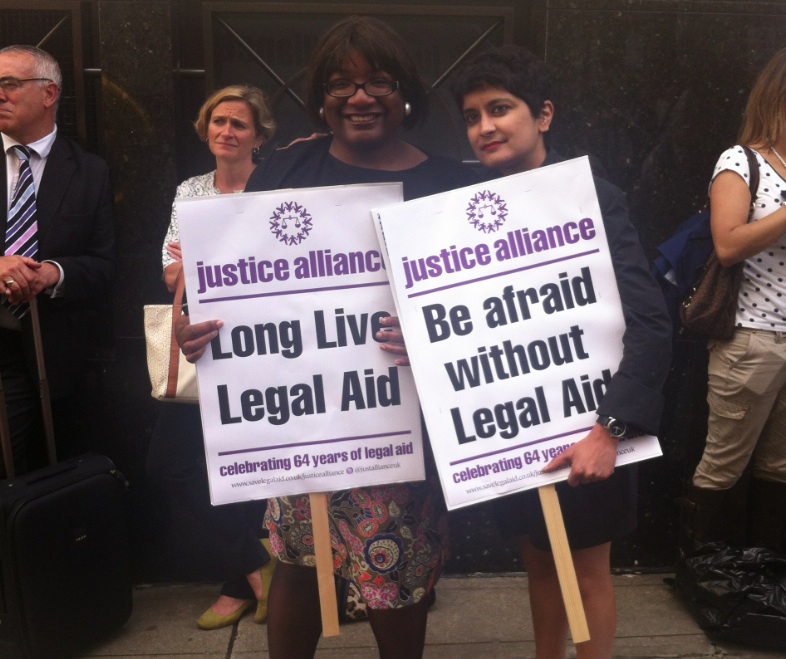A cut too far: LASPO four years on
 If you need to get legal advice or go to court with a claim to do with housing, employment or a private family law dispute, the reason why in most cases you won’t get legal aid to help pay for it is, in a word, LASPO. The same goes for most cases involving private debt, medical negligence, immigration or welfare.
If you need to get legal advice or go to court with a claim to do with housing, employment or a private family law dispute, the reason why in most cases you won’t get legal aid to help pay for it is, in a word, LASPO. The same goes for most cases involving private debt, medical negligence, immigration or welfare.
LASPO which stands for the Legal Aid, Sentencing and Punishment of Offenders Act 2012 came into force on 1 April 2013.Four years on, it has become notorious chiefly for the drastic effects of Part 1 of the Act in removing access to legal aid for the various types of civil matters listed above, and reducing the scope of eligibility for others. Alongside similar cuts to criminal legal aid, it belongs to a period of recent history that has seen unprecedented strikes by lawyers and protests outside the courts and parliament.
Conceived in the early years of the Coalition government, LASPO’s headline purpose was to slash, at a stroke, the annual budget for civil legal aid by £350m. Though considered a basic right since the foundation of the Welfare State, the public funding of legal advice was perceived, in a time of austerity, as being simply far too generous.
But poor planning and a failure to consider the all-too-likely knock-on effects meant that the public funding costs, far from being reduced, were merely shifted to other parts of the Ministry of Justice’s budget. These unintended consequences were most noticeable in the realm of private family law disputes, such as divorce and child arrangements. (Cases involving domestic violence, child abuse or abduction were exempted from the cuts, as were “public law” care cases involving the local authority.)

Flatlining: Ministry of Justice stats
The most notable effect of LASPO here has been the huge rise in litigants in person (LiPs) appearing in court, whose lack of legal knowledge and training has in turn caused two further developments.
First, there has been a tendency for cases involving LiPs to take far longer and involve more work by all the professionals involved — something attested to by the judiciary both anecdotally and in numerous published judgments.
Second, there has been the development of a market for fee-charging “McKenzie Friends”. Traditionally, McKenzie Friends have been unqualified friends or volunteers who provide moral support for LiPs and practical help with managing their cases. But in recent years, so-called “professional” McKenzie Friends have set up business, charging fees for their services, without any requirement to be qualified, insured or be regulated. Some do a good job, but others cause more problems than they solve, and can be worse than no help at all for the unrepresented litigant.
The additional burdens which the cutting of legal aid under LASPO has put on the courts and the judiciary have been documented, not least in a series of judgments in the Family Division.
Lord Justice Aikens explained in Lindner v Rawlins [2015] EWCA Civ 61 at [34] how the public costs have simply been shifted elsewhere:
Yet again, the court was without any legal assistance and had to spend time researching the law for itself then attempting to apply it to the relevant facts in order to arrive at the correct legal answer. … Money may have been saved from the legal aid funds, but an equal amount of expense, if not more, has been incurred in terms of the costs of judges’ and court time. The result is that there is, in fact, no economy at all.
Mr Justice Mostyn noted in MG v JF [2015] EWHC 564 (Fam) there was also a ‘serious risk of the court reaching incorrect, and therefore unjust, decisions’.
Another effect of LASPO has been a surge in demand (or expectation) for the provision of free ‘pro bono’ legal advice and representation, as attested to by the President of the Family Division, Sir James Munby, in another case, Q v Q [2014] EWFC 31. In the same case he noted that the ‘exceptional funding’ scheme under section 10 of the Act, which was supposed to soften its effect in hard cases, was setting the bar so high for help that only eight or nine cases a year were getting the extra funding.
Calls for a review of LASPO and its dire effects began almost from the start, and have continued throughout its four-year history.
Last year, the Labour Party launched an interim report on ‘the crisis in the justice system in England & Wales’, published by the Commission on Access to Justice chaired by Lord Bach. Then, earlier this year, junior justice minister Sir Oliver Heald announced that a long-promised government review would now take place, though (election permitting) it will only be completed until April 2018.
By then, we will have had five years of LASPO and its undeniably drastic consequences.






